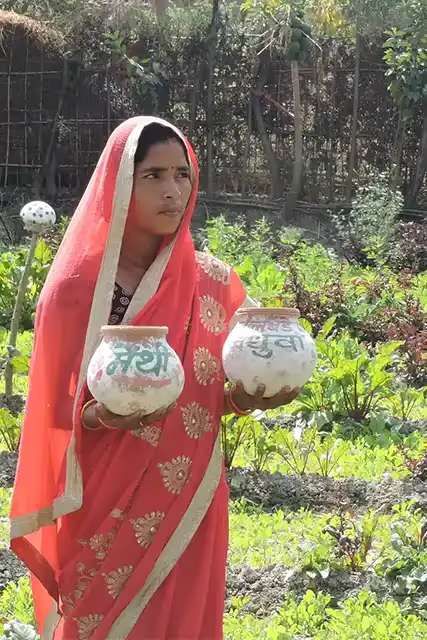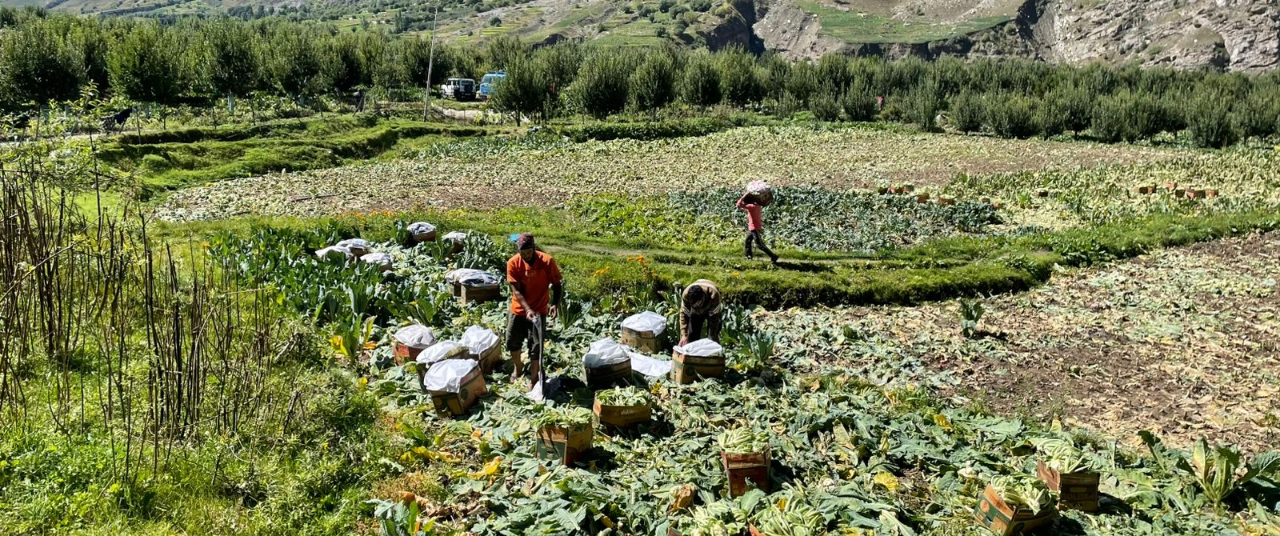Voluntary group promotes natural farming and water conservation






Balchandra Ahirwar, a Dalit farmer from Lidhoratal village in Madhya Pradesh's Tikamgarh district, owns just two acres of land. Despite limited resources, he has successfully implemented low-cost, local resource-based natural farming methods. His efforts have increased production and improved food quality, earning him a government award. He now trains other farmers in natural farming techniques.
He has developed a multi-layer vegetable garden and a small fruit orchard, cultivating up to 44 different crops in a typical year.
Balachandra entirely avoids use of any chemical fertilisers and pesticides from the market. Instead, he makes organic liquid and soil fertiliser and pest repellants on his farm. He has also established a natural farming centre, producing bio-fertilisers using only local resources. These are available to other farmers at a modest price.

His wife, Guddi, has significantly contributed to these efforts. She says, "The benefits of natural farming are clear, especially in terms of the money we used to spend on frequent medical treatments. By eating food grown naturally, we are much healthier now."
Phulbai Chadaar, a farmer with just one acre of land in Digaura village, also in Tikamgarh district, has similarly embraced natural farming. By growing high-quality fruits and vegetables, she has reduced costs and increased income, finding a ready market for her produce. “Earlier I was often pleading before someone for a small loan, now I can give one to you if you need it”, she says with a broad smile.

Three-pronged approach
These success stories are among many emerging from the efforts of SRIJAN (Self-Reliant Initiatives through Joint Action), a voluntary organisation working in Bundelkhand, a region spread across 14 districts of Madhya Pradesh and Uttar Pradesh. SRIJAN's initiatives focus on three main areas:
- Promotion of natural farming: SRIJAN encourages farmers to adopt natural farming practices. Farmers showing interest are supported in setting up natural farming centres, producing organic fertilisers and pest repellents not only for themselves but also for other farmers who are unable to make these products.
- Community-driven water conservation: Bundelkhand is known for its traditional water tanks, many of which have become heavily silted due to a decline in community maintenance. SRIJAN has organised the desilting of tanks in several villages, exponentially increasing their water retention capacity. The fertile silt removed is offered to farmers free of charge to enhance soil fertility. SRIJAN also arranges repairs for old structures like check dams and digs saucer-shaped pits called dohas in water channels to retain more water during dry months.
- Support for small and women farmers: SRIJAN places special emphasis on assisting small farmers, with a focus on women farmers, recognizing their vital contributions to agriculture.

Expanding impact
SRIJAN’s initiatives often begin in Tikamgarh district and are then expanded to other parts of Bundelkhand through collaborations with grassroots voluntary organisations under the BIWAL (Bundelkhand Initiative for Water, Agriculture, and Livelihoods) program.
In Lapaanv village, Chitrakut district, a young woman named Kiran tends to her multi-layer vegetable garden, often chasing away monkeys. Despite challenging conditions, her family has created an organic vegetable garden of exceptional quality, attracting buyers to their remote location. Kiran says her father-in-law, Braj Behari, who was scheduled for eye surgery, experienced significant improvement in his eyesight after regularly consuming amaranth, a leafy vegetable.
In Elha, activist Gajendra reports significant increases in wheat and fodder yields, improved grain quality, and reduced costs in fields cultivated under SRIJAN's initiatives.
In Sakrauhan, Sarita has started a natural farming centre that also focuses on preserving traditional seed varieties. The introduction of multi-layer vegetable gardens has boosted both productivity and the quality of vegetables, which are easily sold in local markets.
In Churiyari of Mahoba district, Keshkali's natural farming centre has brought new hope to farmers. Vipin Tewari, a farmer from the village, has nearly doubled his yield in some fields.
In Thurhat, Ramesh Dada, who runs a successful natural farming centre, says even when his yield does not increase, the superior quality of his wheat allows him to command higher prices. Ghashyam, another farmer, takes pride in his bumper crop of high-quality watermelons.
In Khemkhara, a lotus pond known for its nutritious makhanas (fox nuts) was revitalised through desilting, greatly benefiting the village.

Community building
The cooperation achieved during these community conservation efforts has improved the prospects for such cooperation in future. In Markhera village, Tikamgarh district, the digging of doha water saving pits and check dam repairs has led to collective afforestation efforts and substantial contributions of voluntary labour (shramdaan).
The next phase of these initiatives involves food processing and marketing to increase income through value addition. A women's farmer producer organisation in Tikamgarh district has begun local extraction of groundnut and mustard oil, grading groundnuts, and producing desi ghee, among other products. Subsequently, the Ken-Betwa Women Farmer Producer Company was formed, named after the two main rivers of the region, which has 2300 rural women as its shareholders. Though still in its early stages, the company has already received promising orders for its natural farming-based products.
While these efforts have yielded significant benefits, there is even greater potential ahead. Combining these agricultural initiatives with social reforms, such as reducing the high consumption of liquor and tobacco (especially smokeless tobacco and gutkha) in the region, could further enhance the health benefits.
Explore other topics
References
1. Self-Reliant Initiatives through Joint Action – India. Reviving traditional water harvesting structures. Retrieved from https://srijanindia.org
2. IWP (indiawaterportal.org)
3. https://biwal.org
4. https://kenbetwa.com/




.avif)






